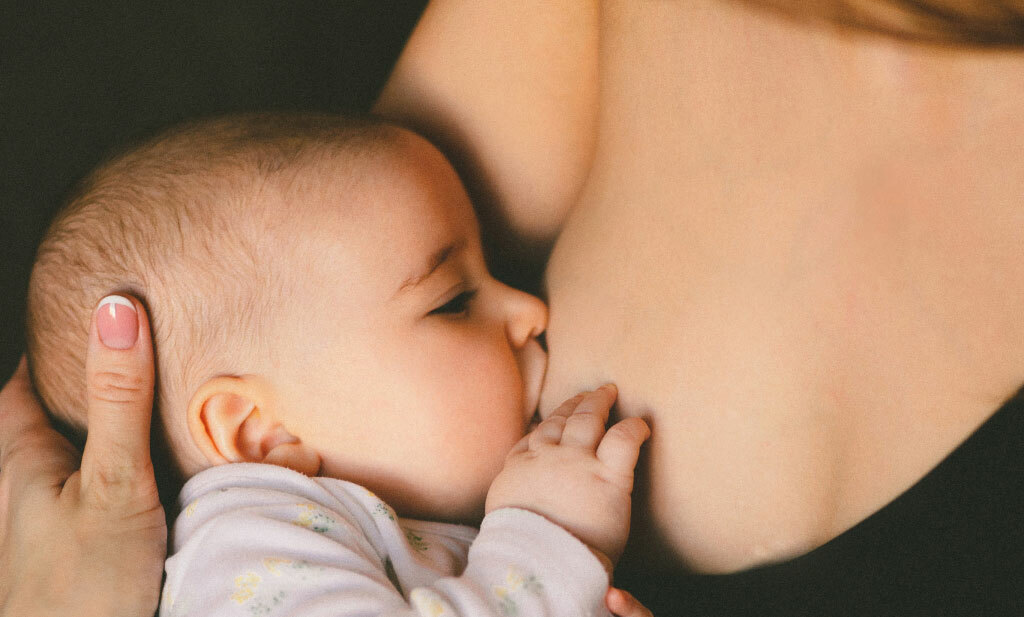
You’ve waited so long for the moment when you finally hold your little baby in your arms. This breath-taking moment, these incredible emotions, this miracle… And yet for many mums (and dads too), this moment heralds a phase characterised by expectations, pressure, and stress. Ideally, of course, this shouldn’t be the case. But unfortunately, in many cases we ourselves and our outside world make sure that we want too much and that everything runs smoothly and perfectly. Especially when it comes to breast/chestfeeding. Mums who want to breast/chestfeed their baby quickly become nervous if things don’t go as planned straight away. Understandably so. After all, they see their baby lying hungry in front of them and want to finally give them what they so desperately want. And then it doesn’t work…
The situation just described leads us to ask how stress and breast/chestfeeding problems are connected. How does the stress experienced by the parent affect breast/chestfeeding? And then asked the other way round, what influence does breast/chestfeeding have on the parent’s state of stress? Our midwife Katrin Ritter has the answers.
Does stress decrease milk supply? How psychological stress affects breast/chestfeeding
Can stress affect breast/chestfeeding? Stress always has an influence on us and our actions, our body and our psyche. And also on breast/chestfeeding. In fact, stress is one of the main things that can lead to breast/chestfeeding problems such as inflammation, insufficient milk production or milk stasis (a build up of milk in the breast/chest) which can lead to mastitis.
The process that causes milk to flow during feeding is called the milk let-down reflex and it is very sensitive. It is triggered by stimuli such as the suckling of the baby or a breast pump, sometimes even by simply looking at the baby. At this moment, the hormone oxytocin is released in the mother’s body. And this subtle process is interrupted by the release of adrenalin which is released when our body is under stress.
What causes stress during breast/chestfeeding?
The explanation as to why this happens goes back a long way to early. humankind as it is a protective mechanism. If there was a threat of danger, the flow of milk stopped so that the feeding parent could first get to safety and then continue to look after baby in peace. Today, the danger is no longer sabre-toothed tigers or the like, but there is another danger lurking in our everyday lives: constant stress. The causes of this can lie within ourselves (such as our own expectations) but also those of the outside world. When it comes to childbirth, these can be the following:
- Fear of failure (“Will I have enough milk? Will I be able to feed my child?”)
- A stressful or traumatic birth
- Pain and illness
- Time pressure and hectic rush
- Fear (e.g. for the baby)
- Pressure to perform and high expectations
- Disruptions (e.g. due to too many visitors or confusing advice)
All of this naturally exerts pressure. And pressure is out of place when breast/chestfeeding. It’s not for nothing that you read everywhere that you should relax when you’re feeding. Everything should be as comfortable as possible, especially when starting out: the right place, the right nursing pillow, peace and quiet,…
How can I stop the stress of breast/chestfeeding?
So now you know that ideally stress should not occur in the first place. But that alone can put you under more pressure. It’s a vicious circle. So, what can you do specifically? First, realise that (in most cases) there is absolutely no reason to assume that it won’t work out. Under normal circumstances, you have everything you need to feed your baby. Work on trusting your body. Your baby is designed by nature to know exactly when they’re hungry and how to get food too. Have confidence. And try to keep calm.
And even if things don’t work out straightaway, support is out there if you need it. La Leche League International and Unicef’s Baby Friendly Initiative are great places to start. They have tonnes of resources on their websites. And don’t be afraid to ask for help. Contact your midwife or health visitor, or a trained lactation consultant if things don’t seem right, most feeding issues can be fixed with the right support. If you’re particularly worried and have the means to do so then you could even contact an IBCLC before baby arrives to have support booked in so you know you have support already in place.
How you can relax while breast/chestfeeding
To help you relax, it is important to relax your body and create a calm and pleasant atmosphere. Sit in a relaxed and comfortable position, you could even turn on soft music and dim the lights. A little warmth might help you to relax: you could try a cup of tea, a warm blanket or a hot water bottle.
Last but not least, it is incredibly important to be honest. With your family and friends, but also with yourself. Because if everything is getting too much for you and you don’t really want any more baby visits, then say so. Everyone around you will (have to) understand. And accept help if it is offered to you. Even better: ask for it. Most mothers in particular are not so good at this. But during the initial postpartum period, the top priority is: take it easy, take it easy, take it easy!
Stress and breast/chestfeeding problems – Is breastfeeding stressful for the body?
Normally, breast/chestfeeding baby is often perceived as a sacrifice, particularly in the modern world. But… it actually helps the feeding parent by reducing physical stress. Feeding baby can help you cope with the challenges of parenthood. Doubts, sleep deprivation, fears for the baby, physical impairments, lack of support and much more… it is no coincidence that around 20% of new mothers complain of depressive symptoms in the first year after giving birth. But nature has made sure that there is something that can help you get through this stressful phase: breast/chestfeeding.
Feeding is important for your stress regulation, but it also has many other advantages. Human milk is the ideal source of nutrition, giving your baby all the nutrients and defences they need. Breast/chestfeeding strengthens your bond with baby – which is currently one of the main reasons why many people decide to breast/chestfeed their babies – along with the positive effects it has on baby’s intelligence and immune function.

Benefits of breastfeeding: Twice as much deep sleep for breastfeeding mums
Sleep deprivation can contribute to feelings of stress. Breast/chestfeeding parents get twice as much deep sleep at night as childless women or those who feed infant formula. This is presumably due to a high level of prolactin, a hormone that is released alongside oxytocin in connection with milk production and feeding that can help with sleep.
Does breast/chestfeeding help with postpartum depression?
Now that we know that breast/chestfeeding has lots of positive effects on the parent’s stress regulation and sensitivity, let’s see whether it also influences postpartum depression. After all, this occurs in 13% of all women in Western cultures within the first three months after giving birth. And indeed, there are good reasons to assume that it can protect against postpartum depression. This is because higher oxytocin levels have been found in non-depressed mothers than in depressed mothers. And as you know, oxytocin is released during breast/chestfeeding.
On the other hand, we should also mention at this point that conditions like postpartum depression naturally also contribute to parents finding breast/chestfeeding more problematic and weaning their baby earlier, while parents with prenatal depression are less likely to start breast/chestfeeding at all.
Stress and breast/chestfeeding problems – a complex relationship
As you can see, stress and breast/chestfeeding problemsare very closely linked and are mutually dependent. However, the positive effects for the child and mother outweigh the negative ones.
All forms of stress have an impact on breast/chestfeeding itself. And your expectations and concerns about successful breastfeeding can certainly cause stress, which then gets in the way. But you can break this spiral! And then it will not only benefit your baby, but also you – physically and mentally. It will help you to get through this stressful first phase in your role as a new mum by making you more sensitive to your baby’s signals and even helping you to get more deep sleep. Breast/chestfeeding can even reduce the risk of postpartum depression. So, have faith and confidence. You’ll do great!
Source: natuerlich-geliebt.de



